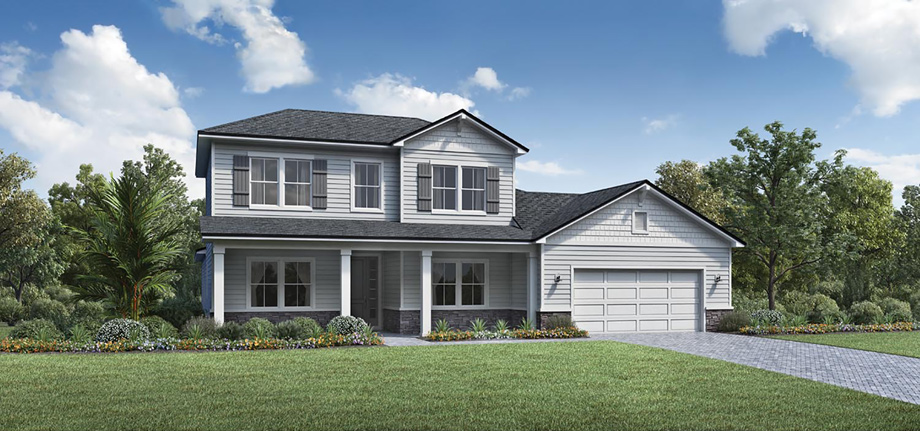
When you are in the market to buy a home, you have an option to consider new construction or an existing home. There are some advantages and disadvantages of each type of home.
If you know the specific neighborhood you want to live in or the school district you want your children to attend, your buying option may be limited to existing homes that are available for sale as there may not be any new construction in the area.
When you consider buying an older home, you may be drawn to the charm of the old house with hardwood floors, wood-burning fireplaces with elaborate mantles, or unique features of the property such as wrought iron posts or staircases. One of the advantages of buying an existing home is that it is often move-in ready and you can move in without having to do worry about completing these large and often expensive projects. Other advantages of a resale home are better location, mature landscaping and trees, and larger lot sizes than those that are found in today's new home communities. There is no guess work about what your neighborhood looks like and how your neighbors take care of their homes. You can talk to the neighbors and find out what they think about their neighborhood. Yet another reason some may choose a resale home over a new construction home is the potential to add "sweat equity" to the home. Many homeowners enjoy home remodeling projects and have the ability to add significant value to the property doing home renovation. Another point to consider is the uniqueness of an older neighborhood versus a new neighborhood. Some people feel that in today's newer neighborhoods all the homes look the same, as though they were punched out with a "cookie cutter". A last point to consider is, depending upon the timing of your move or your need to be in your home by a certain date, you may have no choice but to purchase a resale home that is ready now and not a few months down the road.
Nevertheless, there may be certain disadvantages in purchasing a resale home. There might be carpet stains from children and pets. The countertops may have burn marks or chips and they may be outdated or have unattractive colors. An older home may contain anything from lead-based paints to asbestos found in the shingles or floor tiles. If the house is not updated, you may find that the kitchen cabinets are out of style and that the bathroom features are not to your liking. The utility bills of an older home may also be significantly higher than those found in newer homes. The home may not be well insulated, the windows and doors may fit poorly and have air leaks, and the kitchen appliances may not be as efficient as today's modern appliances. You may find that you need to do significant remodeling to make the existing home meet your expectation.

Some people find the allure of new construction to be too much to resist. If you are looking for the "modern look and feel" of a new home, perhaps new construction home may be the way to go. Watching your home built from the ground up can be very exciting. Seeing how each step leads to the next and knowing where all the studs and pipes are can be as rewarding as choosing your carpet, countertops, or kitchen cabinets. There is a certain satisfaction for many people to know that everything in their new home is "brand new" and that they are the first people to live in the home. Another advantage for many is the knowledge that today's appliances are more energy efficient and quieter than most older appliances. New homes have better insulation; exterior materials require less maintenance; and windows are better insulated. Heating and cooling systems in today's new homes are more energy efficient and do a much better job of eliminating hot or cold spots in the home. Another advantage of a new construction home is the way in which a new home reflects current lifestyles. Friends often gather in the kitchen and cooking becomes a group project. Most people don't want to be far from a TV or the rest of the family when they're in the kitchen. Family rooms are right next to the kitchen and eating areas to blend into a great room. Today's kitchens are often larger than those found in older homes and feature many of the time saving conveniences that today's chefs appreciate. New construction homes often feature luxurious master baths and master bedroom suites as opposed to the smaller utilitarian master bedrooms and baths found in older homes. Closets are larger and often have space saving features like built-in organizers and shoe racks. A new house will usually be wired for cable TV and high-speed Internet access, and they are built to the most current safety, fire and health building codes. Another advantage of a new construction home is the fact that new homes tend to appreciate at a faster rate in the first two to five years after purchase than do older homes. Part of this can be attributed to the fact that during the first few years you are making improvements to the house such as landscaping, fencing, window coverings etc. Another reason for the increased rate of appreciation is the fact that the builder drives the price of your house up by continually increasing the prices of the new construction homes they are selling.
You know nothing is perfect. Sometimes, not even a new house. Even though the new home may have the latest improvements, they sometimes may be installed poorly or incorrectly. Because of this reason, real estate professionals recommend a home inspection before the closing. From the home inspection report combined with your real estate agent's personal observations as well as your own, you can prepare a punch-list for the builder to address and remedy prior to the closing. Another potential downfall of new construction is the way in which the builder handles the warranty work. Some builders will go out of their way to make you homeowner quite happy while others seem to be of the opinion that if they ignore the homeowner's complaints long enough the homeowner will eventually tired of complaining and give up. This is an area where your real estate professional can assist and provide some insight. One point to consider when you may need to sell your new construction home within the first two or three years after you bought, you may want to consider buying a resale home. If the builder continues to build new homes in your neighborhood, it can be difficult for you to sell your home because the builder may be offering incentives that you as a homeowner are not able to compete with. And of course, don't forget that with a new construction home, you will have the added responsibility and expense of purchasing window coverings and installing the appliances, backyard landscaping, and fencing. Depending on the size of your home and your backyard, this can add thousands of dollars to the cost of acquiring your new home.
Regardless of whether you decide to purchase a new construction home or a re-sale home you should be represented. The sales agent at the builder.s sales office works for the builder and represents the builder, not you, the consumer. To put yourself on an even playing field you should have a Realtor looking out for your best interests. Since most builders welcome Realtors and pay their fees, it makes sense to have your Realtor on your side. Your Realtor can assist you in understanding the building process; help you choose the builder options that will provide the most appreciation and value and that are best suited to your needs and tastes. Your Realtor will also know what sets one builder apart from another. Some builders are known for quality, others for low price. Some builders make a great use of space and others always have cutting edge features. The financial strength of the builder and their reputation after the sale is another very important factor, and your Realtor can help you in this area as well. Your Realtor will accompany you when you write the contract and at the construction walk-thrus, giving you the advantage of their knowledge and expertise, as well as another set of eyes to spot any items that need to be corrected during the construction process. Your Realtor will also be there with you at closing, to review your closing documents and to answer any questions you may have. For these reasons and a host of others it is always wise to have your Realtor represent you when buying a new construction or a re-sale home.
Most people think the prices of all new homes are fixed like the price of milk at the store. In the lower price ranges this may be true, but this is not necessarily true in the higher price ranges. This can be an area that your Realtor can negotiate for you. It may take the form of free upgrades, changes in floor plans, special financing or a premium lot that should have sold for more money. While the builder needs to be fair to previous buyers, your Realtor may be able to strike a better deal for you than you could.

Everything in a new construction home is under warranty for a minimum of one year. This is sometimes called a .door to door. warranty or a .builders one year warranty.. It means that everything in the home is covered for one full year. Many of the structural components of the home will come with a two-year warranty. These are typically items such as a furnace, air conditioner, water heater and plumbing. Beyond that there are number of builders that offer a .10 year structural" warranty. This is either in the form of and insurance policy purchased by the builder on behalf of the buyer or the builder.s self-insurance. The 10 year warranty insures the foundation against defects for the first 10 years of the homes life. You will want to know in advance what is covered under your builders warranty and you will want to have a written copy of the warranty to read and review. Take into consideration that a large national builder will probably be able to offer more comprehensive coverage than a small local builder. On a re-sale home you can purchase something known as a "one year home warranty". This is an insurance policy that insures certain components of the home such as the heating, electrical, ventilating, and plumbing systems. If any covered item fails during the term of the policy the company will repair or replace the failed component for a minor deductible. The "one-year home warranty" can be purchased by the buyer, the seller, or it can be split between the buyer and the seller. Typically the cost of this type of warranty does not exceed $300.00. If a failed furnace would create a major financial catastrophe, it may be wise to consider the purchase of a "one-year home warranty" when purchasing a re-sale home.
Whether a new construction or a resale home is in your future you will want to talk to a reputable lender before you get too far into the house hunting process. You will want to know how much of a payment you can afford and more importantly how much of a payment you will be comfortable with. While many builders offer financing, the rate may not be as good as you the rate you could get from a private lender. If you are purchasing new construction, you may want to consider getting your rate locked in since it may be many months before you actually close on your new home. There are numerous lenders that offer this type of loan program. Your Realtor can help you find a good lender.
Again, whether your purchase is new construction or re-sale, get all agreements in writing. If it is not in writing it may not happen. It would be a terrible disappointment to think that you are getting the upgraded hardwood floors, only to find that you are really getting the standard vinyl. Make sure all verbal agreements are in writing.
The purchase of a home is one of the largest financial decisions you will make in your lifetime, and there are many things to consider when deciding whether a new construction or a resale home is right for you. Sit down and talk to your Realtor about your questions and concerns, needs and desires. Your Realtor will be happy to show you both resale and new construction and will be able to provide insight to help you make the right decision.








